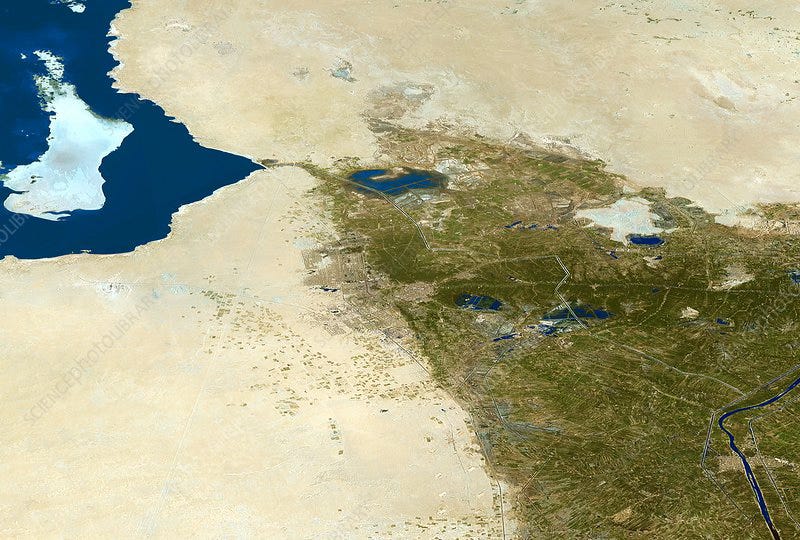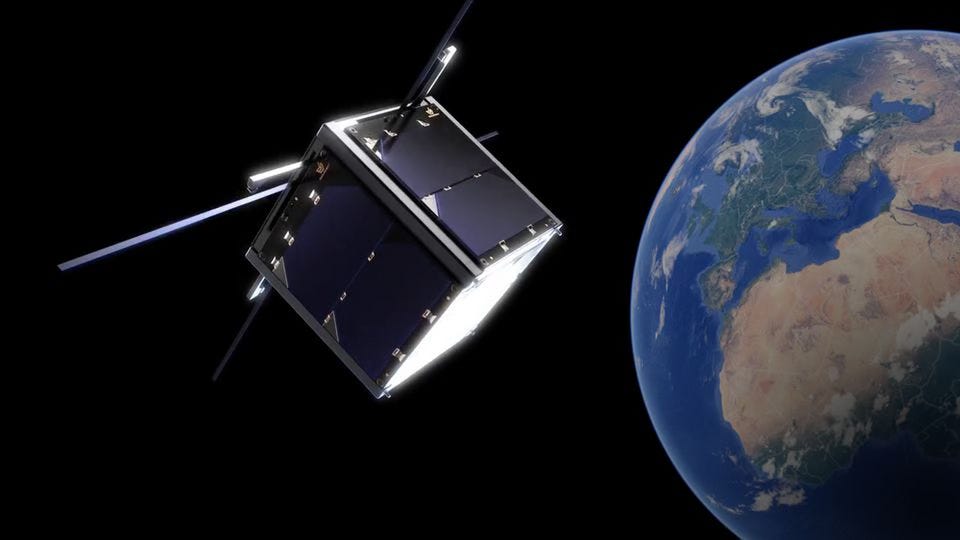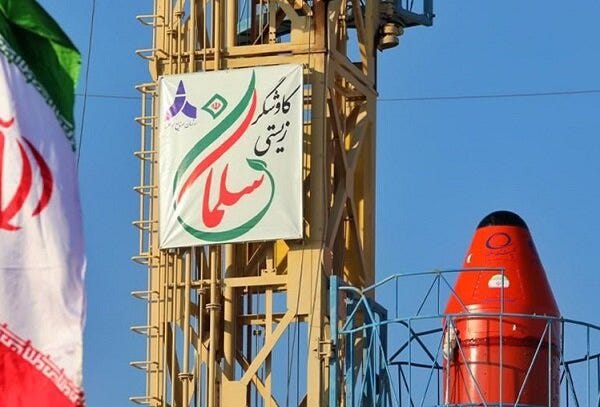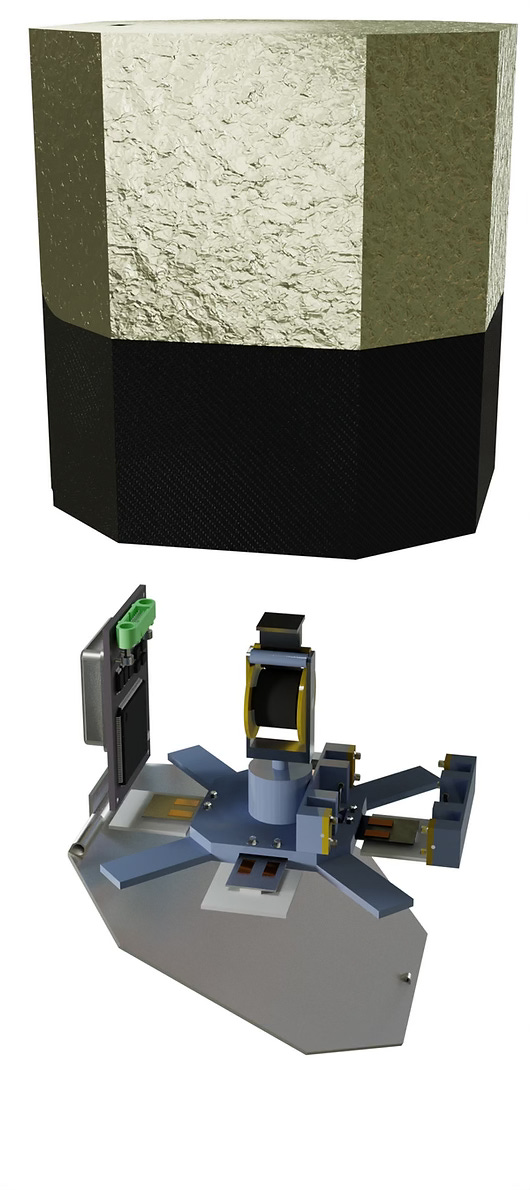Middle East Space Roundup: 22 to 28 July 2024
A summary of all the space news in the Greater Middle East over the past week, brought to you by AzurX

The following are the major space developments in the Greater Middle East region tracked by Middle East Space Monitor over the past week:
Iran Space Developments
Iran’s Latest Two Satellites to be Launched by Russia in October 2024
Iran is set to have two new satellites, Hod Hod and Kosar, into low-Earth orbit by Russia in October 2024. These satellites, developed by the private sector and academic institutions, represent Iran's continued advancement in space technology. Kosar, an Earth observation satellite with a 3.5-meter imaging resolution, is designed for agricultural, surveying, and demarcation purposes with a two-year orbital lifespan. Hod Hod, a research-communication satellite, will focus on Internet of Things (IoT) applications, agriculture, transportation, and crisis management. The Iranian Space Agency (ISA) has also announced plans for additional private sector-developed satellites and the commencement of the Soleimani project, an IoT satellite system. These developments underscore Iran's growing capabilities in space technology, with the country now ranking 11th globally in space science and leading the region. This progress reflects Iran's significant improvement in the field, having advanced from 95th place in 1996 to its current standing among the top countries with space technology expertise.
Iran’s IoT General Soleimani Satellite System to Begin Construction
Iran is advancing its space capabilities with the announcement of its first telecommunications constellation, the General Soleimani Satellite System, set to begin construction later this year. This dual-use narrowband Internet of Things (IoT) system, designed for both government and private sector use, is part of Iran's 10-year space programme launched in January 2023. The constellation, scheduled for low-Earth orbit deployment within the next year, will initially provide IoT services with expansion plans. This project, along with the successful launch of the Noor-3 military observation satellite and the development of Pars-2 and Pars-3 remote sensing satellites, demonstrate Iran's growing ambitions in space technology. The country is receiving support from Russia's Roscosmos in various aspects of its space programme, including infrastructure and telecommunications. These developments underscore Iran's strategic goal of establishing itself as a regional space power, with significant implications for both civilian and military applications in the coming years.
Iran Plans to Launch 6 to 8 Satellites by March 2025
The Iranian Space Agency has announced ambitious plans to launch between six and eight satellites by 20 March 2025, marking a significant expansion of Iran's space programme. Hassan Salarieh, head of the agency, highlighted recent advancements in the country's space infrastructure, particularly the development of the Chabahar space base, which is expected to have its first phase operational by the end of the current Iranian year. The agency's plans include the launch of the Kowsar and Zafar-2 satellites, as well as the placement of the Tolou-3 satellite into orbit using a foreign launch vehicle. These initiatives demonstrate Iran's growing capabilities in space technology and its commitment to establishing a stronger presence in orbital operations. The accelerated pace of satellite launches and infrastructure development suggests Iran is actively working to enhance its position in the global space sector, with potential implications for both scientific research and strategic interests in the region.
Iran Announces Completion of Two New ‘Bio-Capsules’ for its Space Programme
The Iranian Space Agency has reported the addition of two new bio-capsules to its space fleet, marking a significant development in the country's space programme. This announcement follows a previous suborbital flight that reached an altitude of 130-140 km. While the launcher component performed successfully in that mission, issues were encountered with the capsule's slow return subsystem, which is crucial for controlling speed and ensuring a safe landing. The expansion of Iran's bio-capsule capabilities suggests ongoing efforts to enhance its space exploration technologies, particularly in biological experiments and safe payload return. This development underscores Iran's continued investment in its space programme and its ambition to advance its capabilities in suborbital flights and biological research in space environments.
Türkiye Space Developments
Türkiye’s Türksat Marks 20th Anniversary as Country’s Leading SATCOM Operator
Türksat, Türkiye's leading space technology entity, celebrates its 20th anniversary marking two decades of significant advancements in the country's space capabilities. Founded on 22 July 2004, Türksat's origins can be traced back to 1968 with the establishment of the Peyk Telecommunications Group Chief Engineering under the PTT General Directorate. Over the past 20 years, Türksat has overseen the successful launch of multiple communication satellites, culminating in the recent deployment of Türksat-6A on 9 July 9 2024 - Türkiye's first domestically designed and manufactured communication satellite. This achievement positions Türkiye among an elite group of 11 countries capable of producing their own communication satellites, significantly reducing the country's reliance on foreign technology. Türksat's evolution from its early days to becoming a globally recognised brand in space technologies underscores Türkiye's commitment to advancing its space programme and establishing itself as a key player in the international satellite communications sector.
Turkish Airlines and Türksat Sign Deal for In-Flight Connectivity Services
Turkish Airlines and Türksat have signed a memorandum of understanding at the Farnborough International Airshow, aimed at revolutionising in-flight connectivity (IFC) for Turkish Airlines passengers. The agreement, signed by top executives from both companies, outlines plans to provide unlimited, uninterrupted, and high-speed internet access on all Turkish Airlines flights. This initiative will see Turkish Airlines expanding its in-flight connectivity systems across its entire fleet by the end of 2025, offering passengers free and unlimited internet access. The collaboration also involves TCI Aircraft Interiors, a Turkish Airlines subsidiary specialising in aviation products. This strategic partnership represents a major step forward in enhancing passenger experience and connectivity in the aviation industry, potentially setting a new standard for in-flight services among global carriers.
Israel Space News
Starlink SATCOM Now Operational at UAE Hospital in the Gaza Strip
Elon Musk has announced that Starlink, his satellite-based internet service, is now operational at a hospital in Gaza, with support from Israel and the United Arab Emirates (UAE). While the specific location was not disclosed, this development follows Israel's February 2024 approval for Starlink usage in a UAE-funded field hospital in the Gaza Strip. Starlink, operated by Musk's SpaceX, utilises a network of low-Earth orbit satellites to provide internet access in remote or communication-disrupted areas. The Israeli Communications Ministry has indicated that Starlink's services will initially be limited, with plans for expanded use in the future. This marks a significant shift from October 2023 when Israel's Communications Minister threatened to sever ties with Starlink over concerns that Hamas could potentially exploit the service. The implementation of Starlink in this context represents a delicate balance between humanitarian aid and security considerations in the region.
U.S. Company oneNav Tests Jam-Resistant GPS Receiver in Israel
oneNav, a Global Navigation Satellite Systems (GNSS) technology developer, has successfully demonstrated the resilience of its L5-direct Global Positioning System (GPS) receiver technology against extensive interference in real-world tests conducted in Haifa, Israel. The tests, performed in an active conflict zone, compared oneNav's technology to GPS receivers in leading smartphone and smartwatch brands. While traditional receivers failed due to jamming and spoofing, oneNav's L5-direct maintained accurate location data by directly acquiring the modern L5 GPS signal, bypassing the vulnerable L1 signal. This advancement is significant as L5-band signals are 30 times harder to jam than L1 and perform better in challenging environments. The successful demonstration highlights the potential of L5-direct technology to revolutionise GPS applications in both civilian and military sectors, addressing growing concerns about GPS interference globally. oneNav's technology could provide a crucial solution to combat sophisticated GPS jamming threats, which have become increasingly prevalent in conflict zones and pose risks to critical infrastructure worldwide.
Israel’s Gilat Set to be a Major Player in Global In-Flight Connectivity Market
Israel’s Gilat Satellite Networks, founded in 1987, has established itself as a key player in the satellite communication market. The company is now positioning itself to become a leading supplier of in-flight connectivity (IFC) equipment, a market expected to grow significantly in the coming years. Gilat's planned acquisition of Stellar Blu, a U.S. avionics solutions provider, is a strategic move to enhance its IFC capabilities and potentially challenge larger competitors. With only 10,400 out of 25,500 commercial aircraft currently offering in-flight Wi-Fi, the market shows substantial growth potential. Gilat's diversified portfolio, including solutions for military, aerospace, and government sectors, has contributed to its recent financial growth, with revenue increasing 11% year-over-year in 2023. The company's focus on IFC, rural connectivity, and involvement in the rapidly expanding low Earth orbit (LEO) satellite sector positions it well for future growth. However, investors should note that Gilat's stock has faced challenges in recent years, declining 40% over the last five years, indicating the need for continued improvements in fundamental performance.
UAE Space Developments
UAE’s Orbital Space Starts First Privately-Funded Lunar Mission in the Arab World
The UAE’s Orbital Space has launched the Orbital Space Lunar Program, marking the Arab world's first privately funded lunar mission. In collaboration with Astrobotic, the programme will send a student-built experiment to the Moon aboard a Griffin-class lunar lander, with a launch targeted for Q4 2026 or later. The mission's centerpiece, the Lunaris Platform, was developed by students from AGH University of Science and Technology in Poland through a global competition. This experiment will analyse interactions between lunar regolith and various materials for future lunar missions. The programme represents a significant advancement in space exploration and education in the region, offering a range of activities to inspire future generations in space science. This initiative underscores the importance of international cooperation in space exploration and demonstrates the potential for private entities to contribute to lunar missions. The collaboration between Orbital Space, Astrobotic, and academic institutions highlights the growing trend of public-private partnerships in advancing space technology and research.
UAE’s MBRSC Summer Space Explorer Camp 2024 Open for Registration
The UAE’s Mohammed Bin Rashid Space Centre (MBRSC) has announced its Summer Space Explorer Camp 2024, designed for young space enthusiasts aged 11 to 15. Scheduled for August 2024, with separate sessions for boys and girls, the 4-day camp offers a comprehensive programme of theoretical and practical workshops focused on space sciences. Participants will engage in activities ranging from robotics and mission planning to astronaut training simulations and space-themed art projects. Led by experienced MBRSC staff, the camp aims to provide hands-on experience in space exploration, including an exclusive tour of MBRSC's facilities. This initiative is part of MBRSC's broader strategy to cultivate interest in space science among youth, aligning with the UAE's ambitions in the space sector. The camp serves as a platform to inspire and educate the next generation of potential scientists, engineers, and astronauts, contributing to the development of the UAE's future space workforce. To register for the MBRSC Summer Space Explorer Camp 2024 click here.
UAE’s MBRSC to Host COSPAR 2028
The UAE has secured the bid to host the Committee on Space Research’s landmark event COSPAR 2028, marking a significant milestone as the first Arab country to organise this prestigious global space research event. Announced by Sheikh Hamdan bin Mohammed bin Rashid Al Maktoum, the conference is expected to attract over 3,000 international researchers, experts, and scientists to present and discuss cutting-edge scientific research. This achievement underscores the UAE's growing prominence as a key hub for the global scientific community, particularly in space research. The successful bid, attributed to the efforts of the Mohammed Bin Rashid Space Centre (MBRSC), further solidifies the UAE's role in fostering international cooperation within the space sector. This event not only highlights the country's commitment to advancing space science but also positions the UAE as a significant player in the global space research landscape.
Dubai International Financial Centre Courts Rapidly Becoming Space Law Hub
In the first half of 2024, the Dubai International Financial Centre (DIFC) Courts have made significant strides in advancing their innovative strategy and global positioning. Key developments include the issuance of Decree No. (29) of 2024 by Sheikh Mohammed bin Rashid Al Maktoum, establishing a Judicial Authority for resolving jurisdictional conflicts between DIFC Courts and other judicial authorities in Dubai. The DIFC Courts also received recognition for sustainable IT practices from Moro Hub and strengthened international ties through a cooperation agreement with The Law Society of Hong Kong. Additionally, the Courts co-hosted the inaugural Courts of Space Moot Court competition, addressing potential legal scenarios in space-related disputes. These initiatives collectively demonstrate the DIFC Courts' commitment to excellence, innovation, and global collaboration in judicial dispute resolution, aligning with Dubai's vision to become a leading global financial hub.
Other News
Egypt and Singapore Hold Space Cooperation Talks
The Egyptian Space Agency (EgSA) recently hosted a delegation from Singapore, led by Ambassador Dominic Goh, to explore opportunities for bilateral cooperation in space technology. The meeting, held at the agency's headquarters, focused on leveraging both country’s capabilities and expertise to advance their respective space programs. Professor Sherif Sedky, CEO of the Egyptian Space Agency, highlighted Egypt's recent achievements in satellite technology and emphasised the importance of international collaboration. The Singaporean delegation expressed particular interest in Egypt's spatial image analysis and processing technologies, while both parties discussed potential joint research projects, workshops, and training programmes. This visit underscores the growing importance of international partnerships in the space sector, with both Egypt and Singapore recognising the potential for mutual growth and innovation through shared knowledge and resources. The meeting concluded with a commitment to ongoing dialogue and collaboration, reflecting the increasing significance of space technology in global scientific and economic development.
Saudi Arabia’s CST Meets with Space Entrepreneurs
The Communications, Space and Technology Commission (CST) of Saudi Arabia, led by Governor Dr. Mohammed Al-Tamimi, recently held a meeting with space sector entrepreneurs to foster innovation, develop infrastructure, and attract investments. The gathering focused on reviewing recent advancements in the space industry, assessing contributions from both public and private entities, and addressing current challenges. Participants explored investment opportunities aimed at strengthening Saudi Arabia's global position in the space sector. This initiative is part of CST's broader efforts to support space entrepreneurship, exemplified by the establishment of the Space Entrepreneurship Alliance (SEA). The SEA aims to unify support for entrepreneurs across Saudi Arabia, accelerate startup growth and product launches, and facilitate connections between entrepreneurs, investors, and industry experts. These actions underscore Saudi Arabia's commitment to developing a robust, innovative space industry ecosystem and positioning itself as a leader in the global space sector.

Armenia Restructures Space Governance Following Programme Problems
The Armenian government has recently implemented a new oversight mechanism for space activities, highlighting significant gaps in the country's space programme management. Despite the enactment of space activity legislation in 2020 and the much-celebrated launch of Armenia's first satellite, Hayasat-1, in 2023, it has become apparent that these initiatives were conducted without proper supervision. This oversight has led to reported issues with the satellite's performance, including potential interference with other countries' satellites and a lack of tangible benefits for Armenia. The situation has prompted governmental action, with the Urban Development, Technical Standards and Fire Safety Inspectorate now designated as the authority responsible for overseeing space activities. This development, coupled with the reported dismissal of a key official in the High-Tech Industry Ministry, underscores the challenges Armenia faces in effectively managing its nascent space programme and the need for improved governance in this critical sector.
Other News in Brief
Among the other regional space and satellite developments over the past week are:
Bahrain’s National Space Science Agency (NSSA) participated for the first time in Youth City 2030 in its 13th edition with its Space Station Programme for ages 9-14;
Israel’s Gilat Satellite Networks, Ltd., has been awarded over $9M in cumulative orders from multiple satellite operators to expand their global SATCOM networks utilising Gilat’s innovative and field-proven solutions;
Nilesat, Egypt’s private satellite communications operator, has reported a net profit of USD 6.38 million for Q1 2024, a 14.71% decrease on the same period in 2023;
Yahsat, the UAE’s premier satellite communications operator, reports $2.98 million revenue from Africa in Q1 2024.
Be sure to catch up with space activities in the region in the next edition of Middle East Space Monitor’s space roundup!






